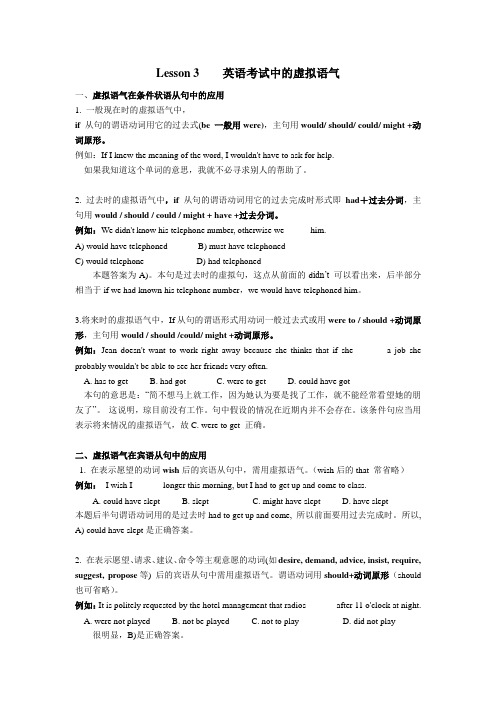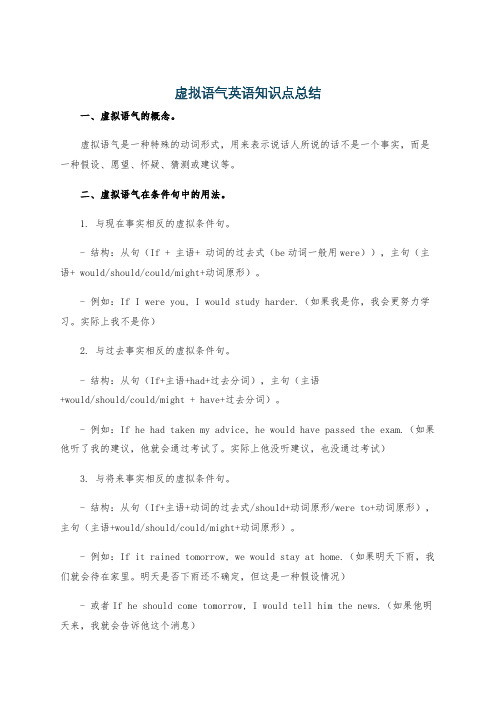英语语法专题讲座3—虚拟语气
- 格式:ppt
- 大小:207.00 KB
- 文档页数:14


虚拟条件句的基本类型与结构一、与现在事实相反若与现在事实相反,虚拟语气的条件从句的谓语用过去式(be通常用were),主句谓语用“should (would, could, might)+动词原形”。
如:If you took a taxi,you'd get there quicker. 如果你坐出租车去,你可以快一点到那里。
(但你不坐)If I knew her number I could ring her up. 要是我知道她的电话号码,我就可以给她打电话了。
(可惜我不知道)二、与过去事实相反若与过去事实相反,虚拟语气的条件从句的谓语用过去完成时(had+过去分词),主句谓语用“should (would, could, might)+have+过去分词”。
如:If I'd left sooner,I'd have been on time. 要是我早点动身,我就准时到了。
(但我动身太迟了)If we had found him earlier we could have saved his life. 要是我们当时早点找到他的话,我们就可以救活他。
(可惜我们找到他太晚了)三、与将来事实相反若与将来事实相反,条件从句的谓语用过去式(be通常用were),主句谓语用“should (w ould, could, might)+动词原形”。
如:If he went,would you go too? 如果他去,你也去吗?(大概他不会去)If I asked him,I'm sure he'd help us. 如果我向他提出要求,肯定他会帮助我们。
(不过我不打算这样做)注意与说明:对于与将来事实相反的情形,请注意以下几点:一是这里说的与将来事实相反,实为对将来情况的推测;二是此用法中的条件从句谓语除用过去式外,有时也用“should+动词原形”(表示可能性极小,常译为“万一”)或“were to+动词原形”(表示与将来事实相反的假设);三是当条件从句使用“should+动词原形”这样的谓语时,主句谓语除可用“should (w ould, could, might)+动词原形”这样的虚拟语气外,也可用陈述语气或祈使语气。

Lesson 3 英语考试中的虚拟语气一、虚拟语气在条件状语从句中的应用1. 一般现在时的虚拟语气中,if从句的谓语动词用它的过去式(be 一般用were),主句用would/ should/ could/ might +动词原形。
例如:If I knew the meaning of the word, I wouldn't have to ask for help.如果我知道这个单词的意思,我就不必寻求别人的帮助了。
2. 过去时的虚拟语气中,if 从句的谓语动词用它的过去完成时形式即had+过去分词,主句用would / should / could / might + have +过去分词。
例如:We didn't know his telephone number, otherwise we _____ him.A) would have telephoned B) must have telephonedC) would telephone D) had telephoned本题答案为A)。
本句是过去时的虚拟句,这点从前面的d idn’t 可以看出来,后半部分相当于if we had known his telephone number,we would have telephoned him。
3.将来时的虚拟语气中,If从句的谓语形式用动词一般过去式或用were to / should +动词原形,主句用would / should /could/ might +动词原形。
例如:Jean doesn't want to work right away because she thinks that if she ______ a job she probably wouldn't be able to see her friends very often.A. has to getB. had gotC. were to getD. could have got本句的意思是:“简不想马上就工作,因为她认为要是找了工作,就不能经常看望她的朋友了”。


语法复习十:动词的语气——虚拟语气一、语气的定义和种类l、语气:语气是动词的一种形式,它表示说话人对某一行为或事情的看法和态度。
2、语气的种类:(1)陈述语气: 表示动作或状态是现实的、确定的或符合事实的,用于陈述句、疑问句和某些感叹句。
如:We are not ready. 我们没准备好。
What a fine day it is!多好的天气啊!(2)祈使语气: 表示说话人的建议、请求、邀请、命令等。
如: Open the door, please。
请打开门。
(3)虚拟语气: 表示动作或状态不是客观存在的事实,而是说话人的主观愿望、假设或推测等。
如: If I were you, I should study English. 如果我是你,我就学英语了。
May you succeed! 祝您成功!二、虚拟语气在条件从句中的用法条件句有两类,一类是真实条件句,一类是虚拟条件句。
如果假设的情况是有可能发生的,就是真实条件何。
在这种真实条件句中的谓语用陈述语气。
如: If it doesn’t rain tomorrow, we will go to the park. 如果明天不下雨,我们就去公园。
如果假设的情况是过去或现在都不存在的,或将来不大可能发生的,则是虚拟条件句。
如: If he had seen you yesterday, he would have asked you about it. 如果他昨天见到你,他会问你这件事的。
(事实上他昨天没见到你,因此也未能问你这件事。
)在含有虚拟条件句的复合句中,主句和从句的谓语都要用虚拟语气。
现将虚拟条件从should 可用于各种人称。
l、表示与现在事实相反的假设和结果。
如: If my brother were here, everything would be all right. 要是我哥哥在这儿,一切都没问题了。
2、表示与过去事实相反的假设和结果。

虚拟语气英语知识点总结一、虚拟语气的概念。
虚拟语气是一种特殊的动词形式,用来表示说话人所说的话不是一个事实,而是一种假设、愿望、怀疑、猜测或建议等。
二、虚拟语气在条件句中的用法。
1. 与现在事实相反的虚拟条件句。
- 结构:从句(If + 主语+ 动词的过去式(be动词一般用were)),主句(主语+ would/should/could/might+动词原形)。
- 例如:If I were you, I would study harder.(如果我是你,我会更努力学习。
实际上我不是你)2. 与过去事实相反的虚拟条件句。
- 结构:从句(If+主语+had+过去分词),主句(主语+would/should/could/might + have+过去分词)。
- 例如:If he had taken my advice, he would have passed the exam.(如果他听了我的建议,他就会通过考试了。
实际上他没听建议,也没通过考试)3. 与将来事实相反的虚拟条件句。
- 结构:从句(If+主语+动词的过去式/should+动词原形/were to+动词原形),主句(主语+would/should/could/might+动词原形)。
- 例如:If it rained tomorrow, we would stay at home.(如果明天下雨,我们就会待在家里。
明天是否下雨还不确定,但这是一种假设情况)- 或者If he should come tomorrow, I would tell him the news.(如果他明天来,我就会告诉他这个消息)- 以及If I were to see her tomorrow, I would give her the book.(如果我明天见到她,我就会把书给她)三、虚拟语气在宾语从句中的用法。
1. wish后的宾语从句。
- 表示与现在事实相反的愿望,从句谓语动词用过去式(be动词用were)。
虚拟语气:表示动作或状态不是客观存在的事实,而是说话人的主观愿望、假设或推测等。
If I were a bird, I could fly in the air. 如果我是一只小鸟,我就能在空中飞行。
I wish I could pass the examination. 我希望我能通过考试。
May you succeed! 祝您成功!I.状语从句中的虚拟语气一、虚拟语气在if 引导的条件句中的用法:1. 表示与现在事实相反的虚拟条件句。
其句子结构为:从句:If + 主语+ 动词的过去式(be 用were) + ……主句:主语+ would (should, could , might) + 动词原形+ ……If I were you, I would go with him. If the weather were fine, I would go there.If it weren’t snowing, we wouldn’t stay in the house.If it weren’t for your help, we would get into trouble.If they were here, he would be speaking to them now.2. 表示与过去事实相反的虚拟条件句。
其句子结构为:从句:If + 主语+ had +动词的过去分词+ ……主句:主语+ would (should, could, might) + have +动词的过去分词+……If you had taken my advice, you would not have made such a mistake.如果你听了我的劝告,就不会犯这样的错误。
If it hadn’t been for your help, I shouldn’t have finished this work on time.要是没有你们的帮忙,我就不会按时完成了这项工作。
初中英语语法重难点专项讲解之虚拟语气虚拟语气表示说话人的愿望、假设、猜测或建议,而不是事实。
虚拟语气是通过句中的谓语动词的特殊形式来表现的,因此,掌握虚拟语气中的各种谓语动词的形式变化,是掌握虚拟语气的关键。
一、虚拟语气在简单句中的用法虚拟语气用于简单句中,一般表示祝愿、命令等。
谓语动词要用原形。
二、虚拟语气在主从复合句中的用法(1)在状语从句中的用法1、条件句中的用法虚拟语气的条件句是用谓语动词的特殊形式来表现与现在、过去事实相反的情况或对将来发生的情况表示怀疑,和直陈语气条件句中的谓语动词形式以及表达的含义完全不同。
虚拟语气条件句中所用的谓语动词的过去时、过去完成时、过去将来时等,只表示不同的虚拟语气,和直陈语气的过去时、过去完成时、过去将来时等毫无关系。
现将虚拟语气的各种具体形式和用法分述如下;a. 表示与现在事实相反的情况①形式条件从句的动词形式主句的动词形式If I (we,you,he,she,it,they)+行为动词的过去式(be的过去式一般用were) I (we) should You (he,she , +动词原形或:they,it ) would所有人称+might(could)+动词原形②用法:If I had more time, I should study German.(fact:I have no more time, so I shall not study German. )If she were not so busy, she would attend the meeting this afternoon.(fact:she is very busy, so she will not attend the meeting this afternoon.)If they didn’t take physical exercises every day, they wouldn’t be so healthy.(fact: they take physical exercises every day, so they are very healthy.)b. 表示与过去誓死相反的情况①形式;条件从句的动词形式主句的动词形式If I (we,you,he,she,it,they)+had+过去分词 I (we) shouldYou (he,she , +have+过去分词或:they,it ) would所有人称+could(might)+have+过去分词②用法:I would have checked my paper again if I had had more time at yesterday’s examination.(fact:I had no more time at yesterd ay’s exam, so I didn’t check my paper again)You would have already recovered from his illness if he had seen the doctor in good time.(fact: He didn’t see the doctor in good time ,so he hasn’t recovered from his illness )c. 表示与将来事实相反的情况①形式:条件从句的动词形式主句的动词形式a. If I (we,you,he,she,it,they)+行为动词的过去式(be的过去式一般用were)通常要与一个表将来的时间的状语连用b. If (we,you,he,she,it,they)+should+动词原形c. If I (we,you,he,she,it,they)+were to+动词原形 I (we) should You would +动词原形或:he(she,it ) would they wouldI (we,you,he,she,it,they)+could(might)+动词原形②用法:If it rains tomorrow, our picnic will be put off.(The weather has been changeable these days.)If it rained tomorrow, our picnic would be put off.( The weather has beenvery good these days.)If it should rain tomorrow, our picnic would be put off.(That would be out of our expectation.)If it were to rain tomorrow, our picnic would be put off. (条件从句谓语动词用were to +动词原形,表示下雨的可能性极小。